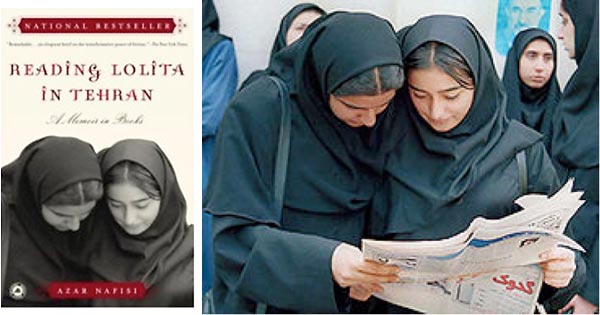
Yesterday’s mention of Azar Nafisi’s Reading Lolita in Tehran: A Memoir in Books gave me an excuse to go back and reread that marvelous book. The work embodies the central premise of this website: that literature can come to our aid when we need it most, helping us negotiate even the most difficult of challenges.
It’s hard to imagine more difficult challenges than those faced by Iranian women under fundamentalist rule, when even tiny aspects of life can be regulated (like cosmetics). Nafisi taught briefly at the University of Tehran during the 1979 revolution but was fired for refusing to wear a veil when the regime turned oppressive. She later taught at another Iranian university and then, in 1995, resigned and taught a small group of women students in her home. Much of the book focuses on those students and their responses to various works, especially Vladimir Nabokov’s Lolita, F. Scott Fitzgerald’s The Great Gatsby, Henry James’s Daisy Miller, and Austen’s Pride and Prejudice.

A. Nafisi
Nafisi chooses these books because of the authors’ “faith in the critical and almost magical power of literature.” She tells her students about how Nabokov concentrated on his poetry during the bloody days of the Russian Revolution and quotes his claim that “readers are born free and ought to remain free.” In a discussion of Nabokov’s Invitation to a Beheading, she talks about how the protagonist Cincinnatus repeats the words “by myself” as he awaits his beheading. Nafisi writes, “This constant reminder of his uniqueness, and his attempts to write, to articulate and create a language different from the one imposed upon him by his jailers, saves him at the last moment, when he takes his head in his hands and walks away towards voices that beckon him from that other world, while the scaffold and all the sham world around him, along with his executioner, disintegrate.”
This theme of finding one’s voice in the face of oppression runs through Nafisi’s teaching. She begins the class with A Thousand and One Nights, using the story of Scheherazade as a framework. While all the other virgins are being slain because of the infidelity of the queen, Scheherazade stays the king’s hand by telling stories. Nafisi finds herself focusing on the victims, who “surrender their virginity, and their lives, without resistance or protest.” They “tacitly accept the king’s public authority by acting within the confines of his domain and by accepting its arbitrary laws.”
Scheherazade by contrast, “breaks the cycle of violence by choosing to embrace different terms of engagement. She fashions her violence not through physical force, as does the king, but through imagination and reflection.”
Tomorrow I’ll continue looking at Nafisi’s book and how she reads Lolita and The Great Gatsby in ways that support her and her students.


One Trackback
[…] in July 2009 when the Greens were protesting the fraudulent Iranian elections, can be found here, here, and […]